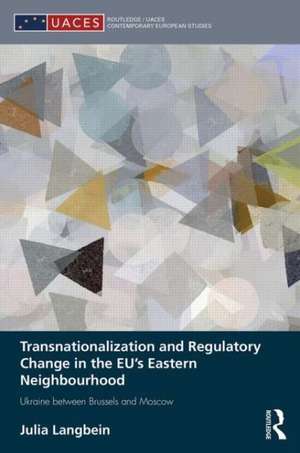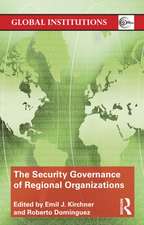Transnationalization and Regulatory Change in the EU's Eastern Neighbourhood: Ukraine between Brussels and Moscow: Routledge/UACES Contemporary European Studies
Autor Julia Langbeinen Limba Engleză Hardback – 18 dec 2014
Using Ukraine as a primary case study, this book examines why convergence with transnational market rules varies across different policy sectors within the Eastern neighbourhood countries. It analyzes the drivers of regulatory change and explores the conditions under which post-Soviet economies integrate with international markets. In doing so, it argues that the impetus for regulatory change in the Eastern neighbourhood lies in specific strategies of domestic empowerment applied by external actors. Furthermore, through the study of the impact of Western and Russian transnational actors, the book concludes that Russia’s presence does not necessarily hinder the integration of the EU’s Eastern neighbours with international markets. Instead, Russia both weakens and strengthens domestic support for convergence with transnational market rules in the region.
This book will be of key interest to students and scholars of European/EU studies and international relations, especially in the areas of regulatory politics, transnational governance, public policy, and post-Soviet transitions.
| Toate formatele și edițiile | Preț | Express |
|---|---|---|
| Paperback (1) | 272.50 lei 6-8 săpt. | |
| Taylor & Francis – 13 iul 2017 | 272.50 lei 6-8 săpt. | |
| Hardback (1) | 945.80 lei 6-8 săpt. | |
| Taylor & Francis – 18 dec 2014 | 945.80 lei 6-8 săpt. |
Din seria Routledge/UACES Contemporary European Studies
-
 Preț: 312.34 lei
Preț: 312.34 lei -
 Preț: 348.15 lei
Preț: 348.15 lei -
 Preț: 310.84 lei
Preț: 310.84 lei - 9%
 Preț: 1005.57 lei
Preț: 1005.57 lei -
 Preț: 393.09 lei
Preț: 393.09 lei -
 Preț: 325.38 lei
Preț: 325.38 lei -
 Preț: 287.68 lei
Preț: 287.68 lei -
 Preț: 275.30 lei
Preț: 275.30 lei -
 Preț: 284.52 lei
Preț: 284.52 lei -
 Preț: 464.54 lei
Preț: 464.54 lei -
 Preț: 464.54 lei
Preț: 464.54 lei - 18%
 Preț: 1057.75 lei
Preț: 1057.75 lei - 18%
 Preț: 1055.51 lei
Preț: 1055.51 lei - 18%
 Preț: 703.79 lei
Preț: 703.79 lei - 34%
 Preț: 822.34 lei
Preț: 822.34 lei - 15%
 Preț: 66.82 lei
Preț: 66.82 lei -
 Preț: 413.33 lei
Preț: 413.33 lei -
 Preț: 284.52 lei
Preț: 284.52 lei - 18%
 Preț: 1000.27 lei
Preț: 1000.27 lei - 18%
 Preț: 699.96 lei
Preț: 699.96 lei -
 Preț: 391.57 lei
Preț: 391.57 lei -
 Preț: 460.69 lei
Preț: 460.69 lei - 18%
 Preț: 1065.06 lei
Preț: 1065.06 lei -
 Preț: 464.54 lei
Preț: 464.54 lei -
 Preț: 315.29 lei
Preț: 315.29 lei - 18%
 Preț: 1054.71 lei
Preț: 1054.71 lei -
 Preț: 483.49 lei
Preț: 483.49 lei -
 Preț: 411.64 lei
Preț: 411.64 lei - 12%
 Preț: 312.43 lei
Preț: 312.43 lei - 26%
 Preț: 850.59 lei
Preț: 850.59 lei - 18%
 Preț: 1060.11 lei
Preț: 1060.11 lei - 15%
 Preț: 701.45 lei
Preț: 701.45 lei -
 Preț: 440.21 lei
Preț: 440.21 lei -
 Preț: 386.51 lei
Preț: 386.51 lei -
 Preț: 462.60 lei
Preț: 462.60 lei
Preț: 945.80 lei
Preț vechi: 1153.41 lei
-18% Nou
Puncte Express: 1419
Preț estimativ în valută:
180.97€ • 188.95$ • 149.78£
180.97€ • 188.95$ • 149.78£
Carte tipărită la comandă
Livrare economică 04-18 aprilie
Preluare comenzi: 021 569.72.76
Specificații
ISBN-13: 9781138795112
ISBN-10: 1138795119
Pagini: 230
Ilustrații: 14 black & white tables, 6 black & white line drawings
Dimensiuni: 156 x 234 x 23 mm
Greutate: 0.45 kg
Ediția:1
Editura: Taylor & Francis
Colecția Routledge
Seria Routledge/UACES Contemporary European Studies
Locul publicării:Oxford, United Kingdom
ISBN-10: 1138795119
Pagini: 230
Ilustrații: 14 black & white tables, 6 black & white line drawings
Dimensiuni: 156 x 234 x 23 mm
Greutate: 0.45 kg
Ediția:1
Editura: Taylor & Francis
Colecția Routledge
Seria Routledge/UACES Contemporary European Studies
Locul publicării:Oxford, United Kingdom
Public țintă
PostgraduateCuprins
List of tables List of figures Acknowledgements List of abbreviations Introduction 1. Theorizing transnationalization and regulatory change in the EU’s Eastern neighbourhood 2. Shareholder rights: Deep transnationalization of public and private actors 3.Technical regulation: Deep transnationalization of public actors 4. Telecommunications: Deep transnationalization of private actors 5. Food Safety: Shallow transnationalization of public and private actors Conclusion Appendix: Interviews References Index
Recenzii
"Langbein’s fascinating new book is the first to treat systematically the European Union and Russia as truly duelling regulatory forces. Focusing on a case study of Ukraine, she provides a nuanced picture of when and where regulations converge with either EU or Russian preferences. Her focus on ‘domestic empowerment’ is especially welcome."
Wade Jacoby, Mary Lou Fulton Professor of Political Science, Brigham Young University, USA.
"This is a highly relevant and timely book, an important contribution to the literature of transnational market making. By exploring various patterns of transnationalization in the Ukrainian economy, the book offers clear and sharp analytical tools to understand the links between regulatory convergence, economic development and regional stability. A must read for students of the political economy of Europeanization in the peripheries of Europe and for everyone who wants a better grasp of the regional dimensions of the present crisis in Ukraine."
László Bruszt, Professor of Sociology, European University Institute, Italy.
"This book is a timely reminder that behind the scenes of the battle for territory and influence unfolding in Eastern Ukraine, global competitive pressures and domestic regulatory capacity building play an important role in determining Ukraine’s convergence with European Union standards."
Antoaneta L. Dimitrova, Associate Professor, Institute of Public Administration, Leiden University, The Netherlands.
"Julia Langbein's Transnationalization and Regulatory Change in the EU’s Eastern Neighbourhood is an excellent and lucid account of institutional change in post-communist Ukraine. It is a first class study of regulatory change and its sources in areas far away from the gaze of most of the scholars of European Union and comparative regulation and transnationalization. I expect this rigorous and theoretically rich study to serve as an authoritative account of regulation and transnationalization and as an example to follow in the study of other sectors, issues, countries and eras."
David Levi-Faur, Professor at the Federmann School of Public Policy and the Department of Political Science, The Hebrew University of Jerusalem, Israel.
"Overall, this is a great book which provides a good analysis of regulatory change in Ukraine and the role played by the EU and Russia in this process. While the European Union is portrayed as a unified actor, Russia is a combination of several different players that have the opposite effect on sectoral regulatory change in Ukraine."
NATALIYA MUZYKA, University of Edinburgh, Europe-Asia Studies
Wade Jacoby, Mary Lou Fulton Professor of Political Science, Brigham Young University, USA.
"This is a highly relevant and timely book, an important contribution to the literature of transnational market making. By exploring various patterns of transnationalization in the Ukrainian economy, the book offers clear and sharp analytical tools to understand the links between regulatory convergence, economic development and regional stability. A must read for students of the political economy of Europeanization in the peripheries of Europe and for everyone who wants a better grasp of the regional dimensions of the present crisis in Ukraine."
László Bruszt, Professor of Sociology, European University Institute, Italy.
"This book is a timely reminder that behind the scenes of the battle for territory and influence unfolding in Eastern Ukraine, global competitive pressures and domestic regulatory capacity building play an important role in determining Ukraine’s convergence with European Union standards."
Antoaneta L. Dimitrova, Associate Professor, Institute of Public Administration, Leiden University, The Netherlands.
"Julia Langbein's Transnationalization and Regulatory Change in the EU’s Eastern Neighbourhood is an excellent and lucid account of institutional change in post-communist Ukraine. It is a first class study of regulatory change and its sources in areas far away from the gaze of most of the scholars of European Union and comparative regulation and transnationalization. I expect this rigorous and theoretically rich study to serve as an authoritative account of regulation and transnationalization and as an example to follow in the study of other sectors, issues, countries and eras."
David Levi-Faur, Professor at the Federmann School of Public Policy and the Department of Political Science, The Hebrew University of Jerusalem, Israel.
"Overall, this is a great book which provides a good analysis of regulatory change in Ukraine and the role played by the EU and Russia in this process. While the European Union is portrayed as a unified actor, Russia is a combination of several different players that have the opposite effect on sectoral regulatory change in Ukraine."
NATALIYA MUZYKA, University of Edinburgh, Europe-Asia Studies
Descriere
Using Ukraine as a primary case study, this book examines why convergence with transnational market rules varies across different policy sectors within the Eastern neighbourhood countries. It analyzes the drivers of regulatory change and explores the conditions under which post-Soviet economies integrate with international markets. In doing so, it argues that the impetus for regulatory change in the Eastern neighbourhood lies in specific strategies of domestic empowerment applied by external actors. Furthermore, through the study of the impact of Western and Russian transnational actors, the book concludes that Russia’s presence does not necessarily hinder the integration of the EU’s Eastern neighbours with international markets. Instead, Russia both weakens and strengthens domestic support for convergence with transnational market rules in the region.
















